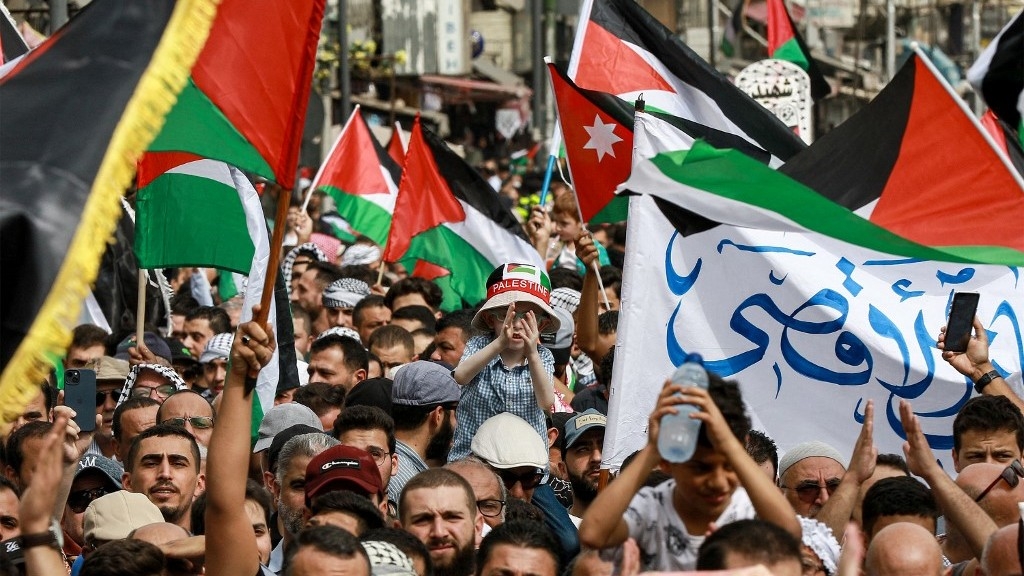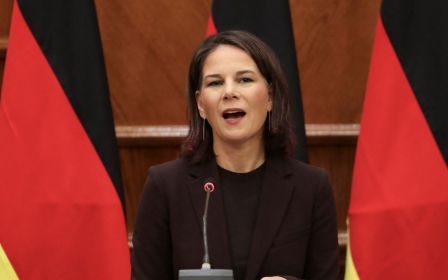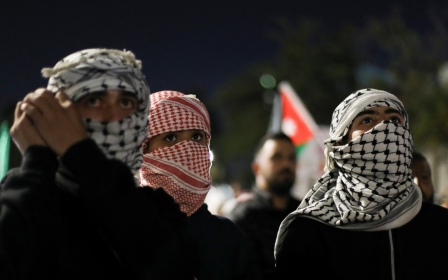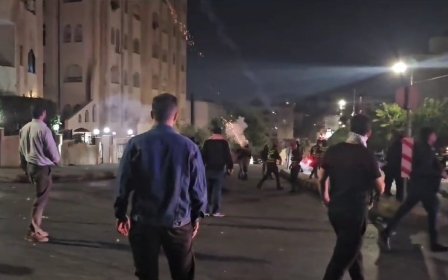Israel-Palestine war: Jordan arrests 25 planning pro-Gaza sit-in

Jordanian security forces arrested 25 men at various locations on Saturday who were planning to hold a sit-in over Israel's continuing bombardment of Gaza at a mosque near Jordan's border with Palestine.
Among those arrested were university students, pharmacists and doctors and 12 members of the Islamic Action Front, the Muslim Brotherhood's political arm in Jordan and the kingdom's largest opposition party.
In footage shared on social media, Jordanian security forces wearing masks are seen arresting a man near the University of Jordan in Amman. Others were said to have been taken from their homes and places of business.
Minister of State for Media Affairs and government spokesperson Muhannad Mubaidin told Middle East Eye that authorities had been "clear from the beginning" that sit-ins were not allowed near the border.
"The border is supervised by the Jordanian Arab Army, and no citizen is allowed to approach it, or demonstrate there," Mubaidin said.
The men, he said, were arrested on suspicion of preparing for activities that harm national security, and remain in police custody and under investigation.
While Jordanian authorities announced on 19 October that sit-ins near the border were prohibited, Saturday's arrests appear to mark an escalation against the kingdom's pro-Gaza movement, opposition figures and protesters said.
Murad al-Adaileh, secretary-general of the Islamic Action Front party, told MEE that since the start of the war, more than a thousand Jordanians have been arrested over their protests, many of whom were released.
"It seems that the Jordanian authorities can no longer tolerate these demonstrations in the street although the number of hospitalisations is rising in Gaza, there are 40,000 wounded, and the occupation continues to destroy hospitals," he said.
Beyond warnings
Israel has been waging a ferocious bombing campaign on the Gaza Strip since 7 October, when hundreds of Hamas fighters attacked Israeli communities near the coastal enclave.
Around 1,200 Israelis were killed in the Palestinian attack. The subsequent Israeli bombardment has killed at least 11,100 Palestinians, including 4,600 children, as of 12 November.
Israel's bombardment has been met with large protests in Jordan, including daily marches in Amman in which some protesters have called for the opening of the border with Palestine so they can go and fight.
On 19 October, days after Jordanian protesters attempted to storm the Israeli embassy in Amman in the wake of the bombing of Al-Ahli Arab Hospital in Gaza, Jordan's Ministry of Interior warned that gatherings on the border were forbidden.
Follow MEE's live coverage of the Israel-Palestine war
Jordan's Public Security Directorate said in a statement: "We will not allow any gatherings towards the border areas. We will implement the instructions issued and call on everyone to respond. We will not allow gatherings that may cause dangers to citizens."
But until Saturday's arrests, authorities had seemed to be using softer approaches to deter protests.
An activist with the leftist Hashd Party, who spoke on condition of anonymity, said authorities had encouraged protesters arrested in the aftermath of the hospital bombing to sign a pledge promising they would not hold sit-ins and acknowledging that they risked a $70,000 fine if they did.
"This prompted a number of young people not to participate in the daily sit-ins in support of Gaza for fear of arrest and financial bail," the activist told MEE.
'The government punishes activists for their intentions to protest peacefully. They were not going to war'
- Murad al-Adaileh, Islamic Action Front party
Adaileh, the IAF's secretary-general, criticised what he called the "policy of arrests".
"The government punishes activists for their intentions to protest peacefully. They were not going to war. They were just responding to a peaceful sit-in," al-Adaileh told MEE.
The sit-in, he said, was to be held at the Abu Ubaidah Mosque, which he said is 20km from the border. "So where is the danger?" al-Adaileh said.
After the arrests, Israeli journalist Edy Cohen reposted the video of the man being arrested near the University of Jordan on X and wrote: "Everyone who participates in the demonstrations against us in all Arab countries will be arrested and imprisoned.
"The Hebrew media wanted to say that this is the fate of those who would stage a sit-in against Israel," al-Adaileh said of the footage being shared. "This is an insult to Jordan."
Middle East Eye propose une couverture et une analyse indépendantes et incomparables du Moyen-Orient, de l’Afrique du Nord et d’autres régions du monde. Pour en savoir plus sur la reprise de ce contenu et les frais qui s’appliquent, veuillez remplir ce formulaire [en anglais]. Pour en savoir plus sur MEE, cliquez ici [en anglais].




